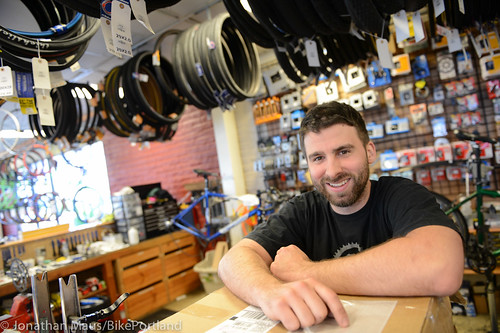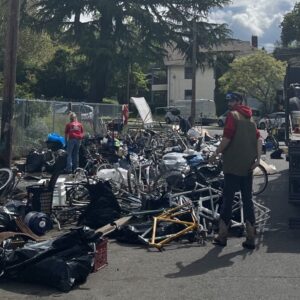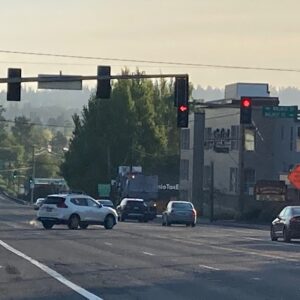Bike shops matter. And like so many brick-and-mortar retailers across this country, many American bike shops have been failing.
How scared should we be about this? And if we’re scared, what’s to be done?
A newly minted Portland State University graduate and employee of the (perfectly healthy) Northwest Portland institution 21st Avenue Cycles is advancing that conversation with a senior thesis he published this year. In it, he proposes a typology (“four types of local bike shops”) and interviews five Portland bike shop professionals about the roles bike shops play and how they interact with a bike-friendly city.
“A community that wishes to establish or maintain itself as friendly towards cycling should recognize the LBS as a crucial part of that image by providing a unique place for all people to gather, socialize, and exchange knowledge.”
— Timothy Wesolowski
In his introduction, author Timothy Wesolowski celebrates the practical role of bike shops as businesses, but starts looking for academically rigorous ways to think about their other roles.
“Is this all that a typical local bike shop has to offer – retail, service, and an open door?” he asks. “A community that wishes to establish or maintain itself as friendly towards cycling should recognize the LBS as a crucial part of that image by providing a unique place for all people to gather, socialize, and exchange knowledge.”
Part of Wesolowski’s project here is to sort bike shops into four categories, similar to the widely recognized “four types of cyclists” concept developed in 2006 by Portland Bicycle Planning Coordinator Roger Geller. Here’s how he splits it up:
The “neighborhood” or “family” bike shop might be the most familiar to the average bicycle rider (likely an “interested but concerned” in Geller’s 2006 typology). This is a shop that is largely service oriented, performing flat tire repairs and tune-ups on less expensive bikes, while selling commuter and children’s bicycles and accoutrements for the casual cyclist.
The “high end” shop specializes in the sale and service of bikes in the several thousand-dollar price range, serving the enthusiast and amateur or even professional cyclist. Often times this shop becomes a destination for cyclists and consumers, who might travel from out-of-town or even state for a comprehensive repair, bicycle purchase, or simply to visit.
“Niche” bicycle shops are the newest of the four models (Gluskin Townley Group, 2014, pp. 11, 17), and cater to a very particular clientele (even more so than the high end shop). There is a growing market for female-oriented bikes and accessories, and female-specific shops are opening to meet the needs of that particular demographic (Gluskin Townley Group, 2014, p. 11).
The final category of non-profit or co-operatively owned bike shop is one that is run explicitly as a community resource. This shop is likely to sell used bicycles and discount accessories to provide accessibility to bicycle transportation. These shops are likely to be located in lower income neighborhoods where there is often greater need for such a service.
Later in the paper, Wesolowski breaks things down a different way, by identifying the “four community roles” that a local bike shop can play.
There’s the “anchoring institution,” which create a general sense of place for everyone in a neighborhood:
Anchoring institutions are often monumental structures like grand cathedrals, but the LBS can share some of this visual prominence. Many bike shops will have a row or rows of bicycles out front of the shop to display models and catch the eyes of passersby. Murals are not an uncommon sight on the sides or even facades of some shops, generally in contrast to more conservative retail storefronts. Finally, a LBS serves as a good landmark for local and visiting cyclists to navigate in a neighborhood or city
There’s the “third place,” a refuge away from both work and home where people can relax and interact:
A different respondent lamented the loss of the “barber shop” model of bicycle shop as-third place where one can go to “just chew the fat”, describing it as a “dying breed” in most towns. Another respondent spoke of recent plans to physically expand his shop with a covered front patio to encourage local wheelmen and women to gather before and after rides with an inviting space to share stories, pump up tires, and even perform minor adjustments to their bicycles: “We’d like to cultivate that. That’s something we aspire to. There’s value in that.” This idea of physical prominence as an invitation for gathering directly relates to the principles of an anchoring institution while also fostering the third place ideal of being a neutral gathering space.
There’s the “advocate,” in which bike shop owners and employees use their expertise, connections and resources to “create social change on behalf of others who are unable to advocate for themselves.”
Advertisement
And finally there’s “infrastructure,” which is defined as the “underlying base or foundation for an organization or system.” Wesolowski echoes National Bicycle Dealers Association executive director Fred Clements in proposing that bike shops meet that definition.
Does this mean that governments should act to protect and preserve bike shops? Weslowski has an interesting conversation with one bike shop pro who’s leery of that idea, arguing that to keep playing a meaningful role in the bike community, shops’ business models must remain “fluid and responsive” to change.
This is a qualitative paper, not a numbers-based one, so Weslowski isn’t trying to come up with any dubiously specific formula for saving bike shops, or even for explaining how cities have ended up with a category of retailers that, at their best, let “financial gain commingle with community gain.” Instead, he’s bringing the tools of academics to a question that’s going to be very important to the future of urban bicycling.
Here’s one last passage from the paper that I found especially striking:
I encountered many connections to Abrahamson’s definitions and theories of urban enclaves (1996). Enclaves contain self-identified communities of individuals who relate to one another based both on place and a shared cultural trait (Abrahamson, 1996 p. 5). These are best exemplified in larger cities’ Chinatowns or other similar racially or ethnically defined neighborhoods, but perhaps we can imagine a broader ‘bicycle community’ as having enclaves centered around many different neighborhood bike shops. As Abrahamson describes, “Attraction to an enclave can also be based on the goods and services…offered in its specialized stores and institutions.”
Riding a bike is a lot different from being part of a particular racial or ethnic group, of course. But for people who care about bikes, a great bike shop can function a lot like a barber shop or a Knights of Columbus hall. Even if someday we have to get every saddle and sprocket delivered to our front porch, let’s hope we find ways to keep making it profitable for a few good business owners to play that larger role.










Thanks for reading.
BikePortland has served this community with independent community journalism since 2005. We rely on subscriptions from readers like you to survive. Your financial support is vital in keeping this valuable resource alive and well.
Please subscribe today to strengthen and expand our work.
isn’t “scared” a bit of a strong word? what the hell is there to be “scared” of?
I’m glad the ‘perfectly healthy’ was added after the reference to failing bike shops, as the owner of this shop (and a few others in Portland) just opened another shop. This is no indication that he’s rolling in the dough as a shop owner, mind you, but he is willing to take risks and his communities benefit from convenience and employment as a result. Maybe ‘scared’ is too strong a word, but having more options and more people employed in local service industries is generally something desirable, and when that trends downward people start to worry in general (and spend less in response to that worry).
One may argue that PDX has too many bike shops and a “niche” bike shop is probably doomed to the same fate as the proliferation and now demise of all the cupcake shops. If you’re going to be a niche shop, you better be the best because a given market can only support so many of a give type. Like how many women oriented shops is the correct amount? How about cargo bike specific?
More importantly the consumer is going to speak to the longevity of a shop. Everything from how clean is your shop to how the sales people or even mechanics treat customers. All of that like in any service oriented business will make or break a shop. We all want people supporting local businesses, however there will always be a dollar vs emotional (for lack of a better term) battle. For example, will a consumer buy an XT rear derailleur at a local shop for $120 when they can mail order it for under $70 especially if they know how to install it themselves?
Velo Cult is a great example of a shop that has grown to be more than a bike sales and service shop. I’ve never bought a bike related thing there, but been there for drinks and hanging out with friends.
Niche shops also work well when paired to social media and internet presence. It’s not just about selling in your physical location, but selling to all those in the niche nationwide, if not world wide.
I wish bike stores were more like auto parts stores. For instance, I do most of the work on my bikes (for reasons of pride, convenience, and cost). If I go into a brick-and-mortar store, they likely will not have the part I need and will have to order it. So there is little convenience added from ordering the part from a local store instead of ordering it online.
I realize why this is not the case even though I don’t mind paying extra if the part was in stock. If any have been to an auto parts store, chances are quite good they will have the part you need in the store for basic repairs, i.e. things that wear out frequently. Not the case for most bike stores.
Not only does City Bikes seem to usually have what I want in stock (and used!), they will loan you special tools for free to work on your bike right there.
I’ve been going to different bike shops around town to find one I really like and City Bike was suggested to me by one of the clerks at universal for parts for my 70s era bike. I have to say, city bikes was awesome! I needed an odd sized seat post and they had one, also a couple other little odds and ends universal didn’t carry. All together I got out of their pretty cheap and was able to finish up my project.
it is of course true the LBS will not typically carry a large range of bottom bracket pullers, because they will not sell many, and you cannot be tying up capital in stock that will not move. that said, i have bought the occasional tool through universal rather than online.
But given the economic size of the bike community in town, wouldn’t it make sense for all of Portland’s bike shops to band together and create a 3rd party local, in-town, 24/7 no frills bicycle parts warehouse?
It would make sense for it to be a separate entity, like a corporate membership warehouse club store for bike shops. They could have a small fleet of delivery vans that respond to requests within a hour or so. This is essentially what NAPA does for car repair shops so they aren’t wasting all their time running around.
This way I as a bike community supporting consumer can have retail store type access (because I am the Avatar of Impatience) to an internet selection of parts at only a slight mark-up.
A warehouse “store” with limited public staff is unburdend of the higher overhead costs of a retail store not the least of which are location, staff and security.
It could be a co-op, a for profit business, or a straight up non-profit inventory holding and distribution box hiding in a low cost industrial part of Portland.
I’ve always been a supporter of the brick and mortar, local bike shop, even with all the usual oddities that we love. One trend not mentioned here is the proliferation of “discount” shops. These “two” multi store chains have created an environment of discount first, knowledge second or even last. They don’t value knowledge or experience and pay accordingly. Thus lowering the income ceiling every time there’s a new hire. This doesn’t create employee or customer loyalty. This, doesn’t help the industry, where often times customers look at it as selling “toys”, thus not inspiring much value. Most shop people can’t make a “living wage”. Since these companies are only concerned with discounting, they also don’t value spending time or money supporting their local communities. So, what do they really provide to the local industry? Why shouldn’t I buy online when the service that I may get from these two chains is sub standard? Not all shops are this way, but this is the trend. How many of you have gone into your local shop and not recognized anyone due to the revolving door of employees? I am glad to see the unique approaches to bike culture that we have here, such as Velo Cult where I can get a tasty cold beer and hang out with other cool bike folks. The thesis is close, but flawed in it’s ability to recognize the changing market place. Opinion only here. Great start though, I’m glad to see someone addressing the situation.
Another role that shops play is for the traveler. Tomorrow I’ll pick up a bike to log some miles with my boss here in Georgia over the weekend. (Incidentally after hitting two shops that don’t rent – one a high end ‘niche’ shop – he suggested I try spinlister, where I found the perfect bike nearby whose owner was away for the weekend). I’ve rented bikes and bought souvenir jerseys all over the country and world… after all, these are local to someone, and I try to compensate for the local knowledge they’re often more than happy to impart on the out-of-towner.
I’m all about brick and mortal shops, but what’s up with the crap attitude? Makes me hesitant to even enter some shops and in some cases even resort to Ebay rather than deal with someone getting all snotty at me and effing up my mood.
Fun topic for an BA thesis!
I saw mention of education, and mention of community bike shops, but at a skim, it didn’t seem clear to me that the thesis really covered bike collectives (aka community bike shops) as a place where people go to learn how to work on their bicycles. I can see why, from a Portland perspective, it’s maybe 1-3 bike shops. However, there’s at least one in many major US cities. A small but noteworthy category. http://www.bikecollectives.org/wiki/index.php?title=Community_Bicycle_Organizations
I was a frequenter of auto parts stores for years, both for myself and friends, and also for paid repair jobs. There’s a pretty stark difference between what a bike shop and an auto parts store contribute to the urban fabric.
Both are congruous with their surroundings, and thats when the primary differences lie. Auto parts stores have parking lots, usually stained with oil, transmission fluid and a melange of other chemicals. They’re almost always in a suburban setting and located on a main thoroughfare. Whip this indeed fits well with its surroundings, it’s inherently a much more impersonal experience due to the site and situation. Usually these parts stores are national chains.
Bike shops on the other hand don’t always have parking (for cars at least) and tend to be situated in areas where they are congruous with their surroundings. Higher density, less chain stores, more walkable/bikeable.
From my limited bike shop experience, the people tend to be more knowledgeable and friendly than at auto part stores. The products available and on display are pretty inoffensive, while auto parts stores are full of exhaust pipes, bully bars, chemicals, and other things that are loud and toxic.
Ultimately the role of bike shops appears to be catering to people and the needs they have for human powered transport. Auto parts stores on the other hand by their nature and situation in suburban settings lend themselves to isolation.
This also sounds a lot like the Ace and True Value hardware store business model where there is a central purchasing, warehousing, distribution, and marketing operation with individually owned retail stores. This model has potential since it has helped keep locla hardware stores viable in the face of big box competition.
Also it’s worth noting that one brick and mortar bike shop in Portland does effectively have a large warehouse operation behind it, but Universal Cycles is something of a special case since the their main business is online sales.